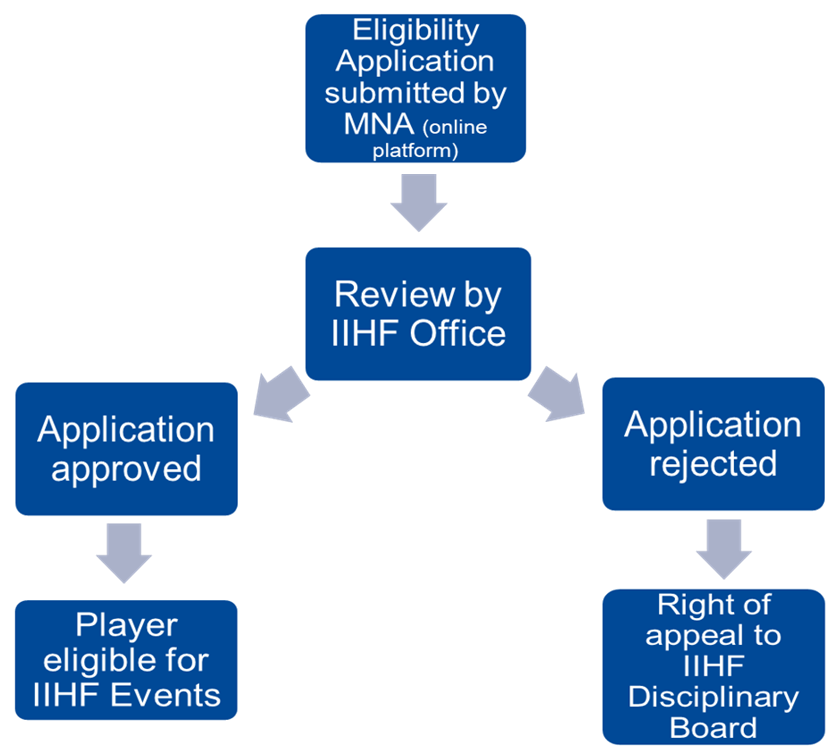IIHF Eligibility
To play in the IIHF World Championship, the Olympic ice hockey tournament and the qualifications to these competitions, players must fulfill the following qualification requirements:
- Each player must be under the jurisdiction of an IIHF member national association.
- Each player must be a citizen of the country he/she represents.
Acquiring a new national eligibility (The ‘two-year’ case)
When a player has changed his citizenship or has acquired another citizenship and wants to participate for the first time in an IIHF competition representing the new country he/she must:
- Prove that he has participated for at least two consecutive hockey seasons and 16 consecutive months (480 days) in the national competitions of his new country after his 10th birthday during which period he has neither transferred to another country nor played ice hockey within any other country. Female players need to have participated on a consistent basis for at least one hockey season and have been member of the new national association for at least 8 consecutive months (240 days) during that period.
- Have an international transfer card (ITC) that shows the transfer to the national association of his new country and which was approved and dated at least 16 months (480 days) before the start of the IIHF competition in which he wishes to participate.
- For female players the period is 8 months (240 days) instead of 16 months.
Change of national eligibility (The ‘four-year’ case)
A player, who has previously participated in IIHF competition, can switch national eligibility (but only once in a player's life) if:
- He/she is a citizen of the new country of his choice
- A male player has participated for at least four consecutive years (1460 days) in the national competitions of his new country, during which period he has neither transferred to another country nor played ice hockey within any other country and has not played for his previous country in an IIHF competition during this four year period. For female players the period is two consecutive years (730 days).
- He/she has an international transfer card (ITC) that shows the transfer to the national association of the new country and which was approved and dated at least four years (two years for female players) before the start of the IIHF competition in which the player wishes to participate.
More detailed information can be found in the IIHF Statutes & Bylaws.
IIHF Eligibility Procedure
All players that wish to participate in an IIHF Championship will have to fulfill the IIHF Eligibility rules.Players that only have, and ever had, one citizenship, are automatically eligible to play for the country of which they have citizenship.
Players that currently hold multiple citizenships, or have ever held a citizenship different from the citizenship of the country of which they want to represent, must fulfill the IIHF Eligibility requirements set out under IIHF Bylaw 4 in order to participate in an IIHF Competition. For these players, an Eligibility Application will have to be submitted to the IIHF.
Players that wish to compete in an IIHF Competition but whose eligibility under the IIHF Eligibility rules is unclear, can apply for an IIHF eligibility ruling by submitting an Eligibility Application to the IIHF.
All Eligibility Applications must be submitted to the IIHF by the national federation of the country the player wishes to represent. The IIHF does not allow any eligibility requests directly from players or clubs. When the IIHF receives an eligibility request from a player or club, it will refer the request to the MNA. An MNA can submit an Eligibility Application to the IIHF via the IIHF Transfer System.
The IIHF Office reviews all Eligibility Applications and determines whether the application is approved or rejected.
The player’s national federation may appeal an IIHF Eligibility rejection decision to the IIHF Disciplinary Board within 7 days of the date of the decision. Such appeal cases will be conducted in accordance with the IIHF International Transfer Regulations and, where applicable, the IIHF Disciplinary Code.

